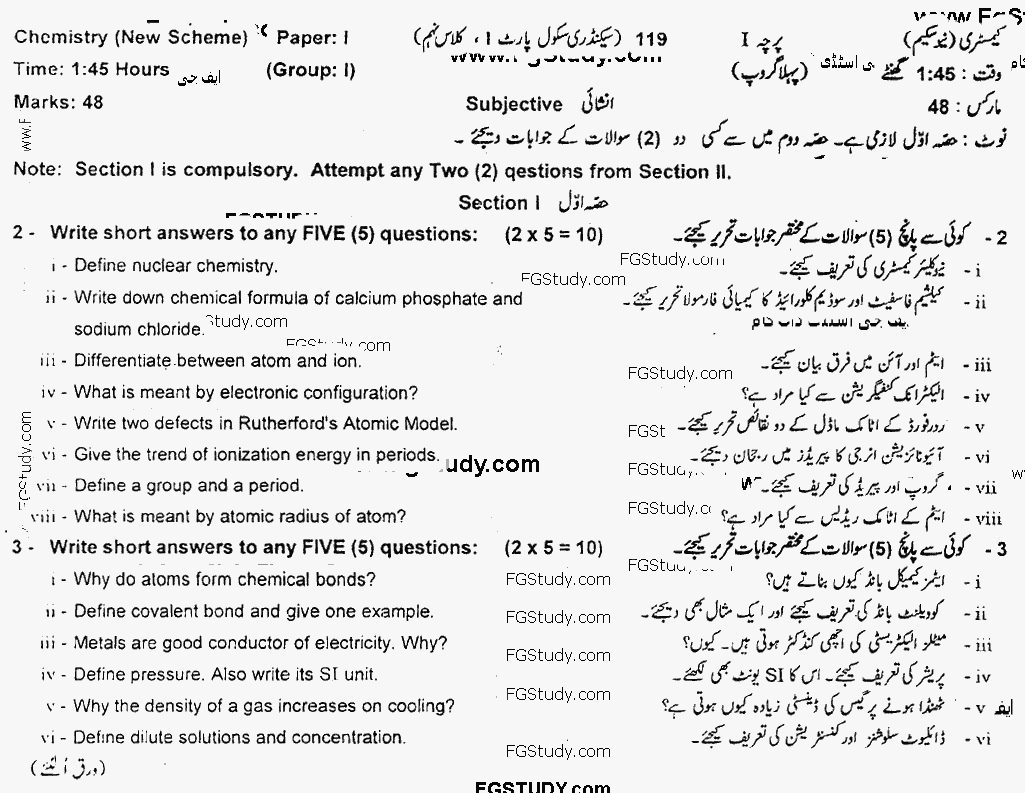Chemistry is the scientific discipline that deals with the study of matter, its properties, composition, structure, behavior, and the changes it undergoes during chemical reactions. It is often referred to as central science because it connects and overlaps with other branches of science, such as physics, biology, and geology.9th Class Chemistry Notes 2024 All Chapters
9th Class Chemistry PDF Notes
| Chapters | Chapter Name | Medium | |
|---|---|---|---|
| 1 | Fundamentals of Chemistry | English Medium | |
| 2 | Structure of Atoms | English Medium | |
| 3 | Periodic Table & Periodicity of Properties | English Medium | |
| 4 | Structure of Molecules | English Medium | |
| 5 | Physical States of Matter | English Medium | |
| 6 | Solution | English Medium | |
| 7 | Electrochemistry | English Medium | |
| 8 | Chemical Reactivity | English Medium | |
About PDF Notes For Chemistry
Notes are written materials that capture important information, ideas, and concepts from lectures, textbooks, or other sources. They serve as a personal record of key points, allowing individuals to review and consolidate their understanding of a particular subject.
Here provide to all student Notes in PDF Form for better preparation for the exam. The Notes provide all information given in papers like:
- MCQS
- Short Question
- Long Question
For more information about subject notes visit TodayAims.com.9th Class Chemistry Notes 2024 All Chapters
Topics covered in 9th-grade chemistry
In 9th-grade chemistry, students typically cover a range of fundamental topics that lay the foundation for further study in the subject. The specific curriculum may vary depending on the educational institution and the region.
Here are some common topics covered in 9th-grade chemistry:
- Matter and Its Properties:
- Introduction to matter and its classification (elements, compounds, and mixtures).
- Physical properties of matter (mass, volume, density, etc.).
- States of matter (solid, liquid, gas) and their characteristics.
- Changes in matter (physical and chemical changes).
- Atomic Structure:
- Introduction to atoms and their structure.
- Subatomic particles (protons, neutrons, electrons) and their properties.
- Atomic number, mass number, and isotopes.
- Electronic configuration and the periodic table.
- Chemical Reactions and Equations:
- Introduction to chemical reactions and their significance.
- Balancing chemical equations.
- Types of chemical reactions (synthesis, decomposition, displacement, and double displacement).
- Chemical formulas and equations.
- Acids, Bases, and Salts:
- Properties of acids and bases.
- pH scale and indicators.
- Neutralization reactions.
- Introduction to salts and their properties.
- Metals and Non-metals:
- Introduction to metals and non-metals.
- Physical and chemical properties of metals and non-metals.
- Reactivity series of metals.
- Extraction of metals from ores.
- The Periodic Table:
- Organization of elements in the periodic table.
- Groups and periods.
- Properties and trends of elements in the periodic table.
- Structure of Atoms and Molecules:
- Ionic and covalent bonding.
- Lewis dot structures.
- Molecular and empirical formulas.
- Intermolecular forces.
- Environmental Chemistry:
- Introduction to environmental pollution.
- Air, water, and soil pollution.
- Causes and effects of pollution.
- Conservation of resources.
- Basic Organic Chemistry:
- Introduction to organic compounds and their characteristics.
- Functional groups.
- Nomenclature of simple organic compounds.

Tips For Preparation Paper
- Understand the concepts: Focus on grasping the fundamental principles and theories.
- Review and organize your notes: Summarize key information and create concept maps.
- Practice regularly: Solve a variety of problems and numerical exercises.
- Work on sample papers: Familiarize yourself with the question format and types of questions.
- Seek clarification: Don’t hesitate to ask your teacher or classmates for help with any doubts or questions.
- Create flashcards: Use them to memorize important concepts, equations, and definitions.
- Study in groups: Collaborate with classmates to discuss and explain concepts to each other.
- Practice time management: Develop a study schedule and allocate sufficient time to each topic.
- Take breaks and take care of yourself: Rest, eat well, stay hydrated, and maintain a balanced lifestyle.

